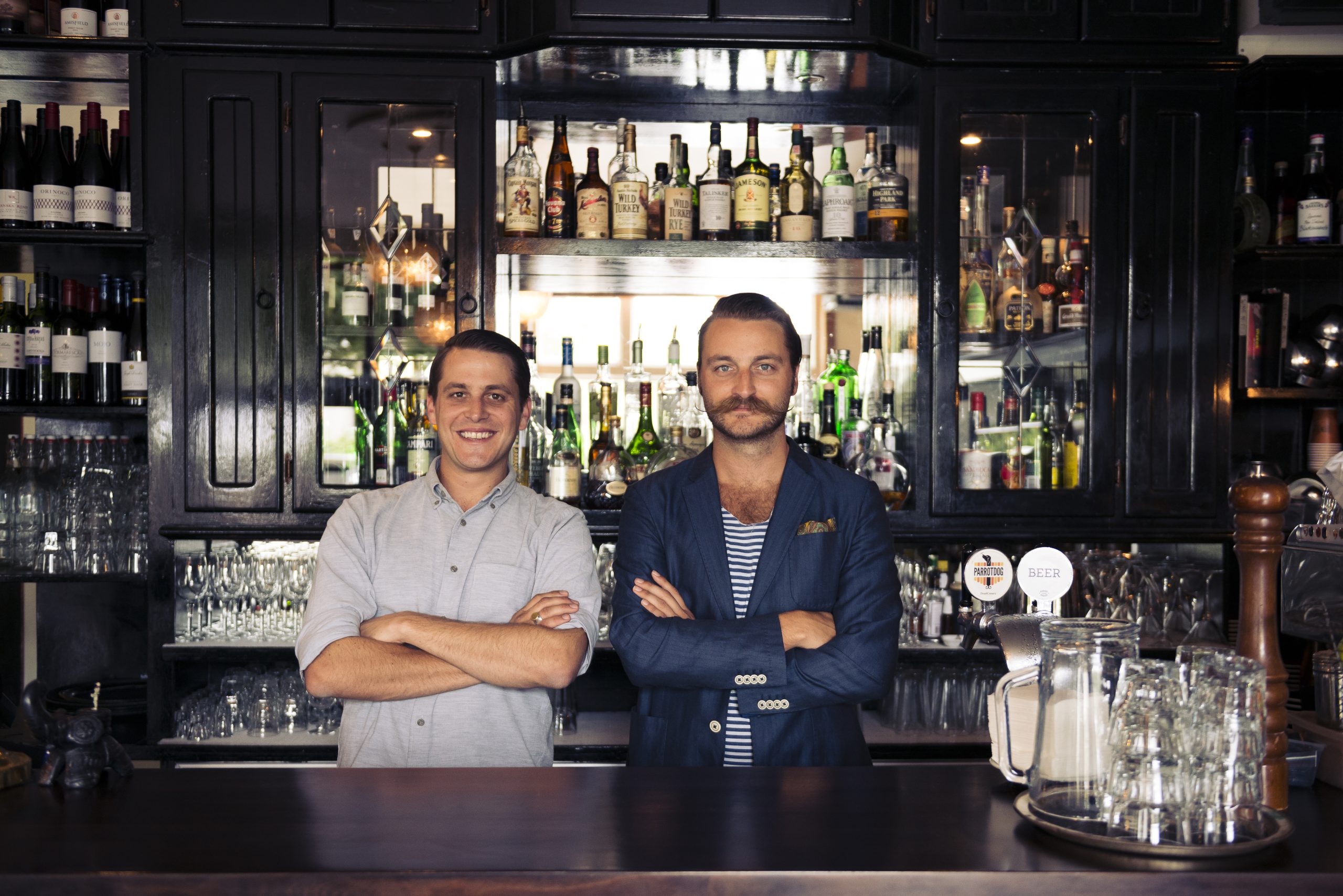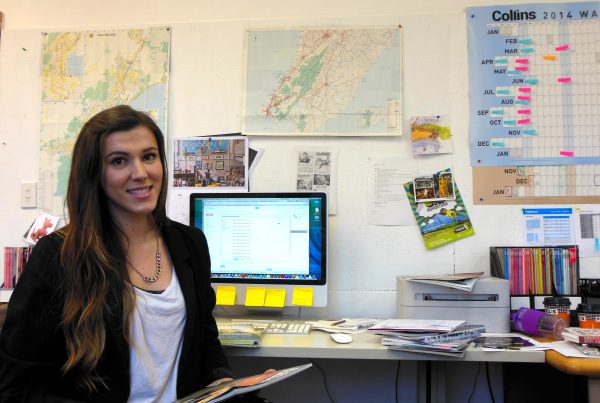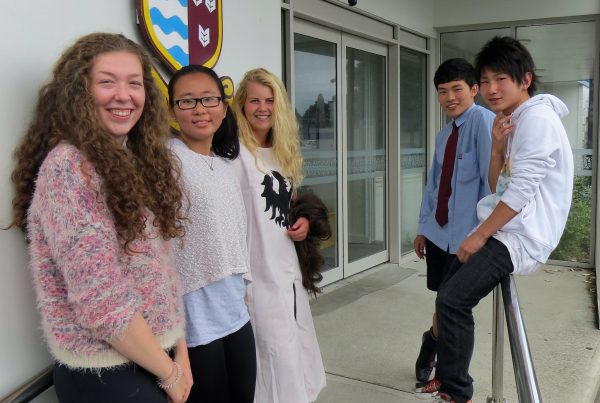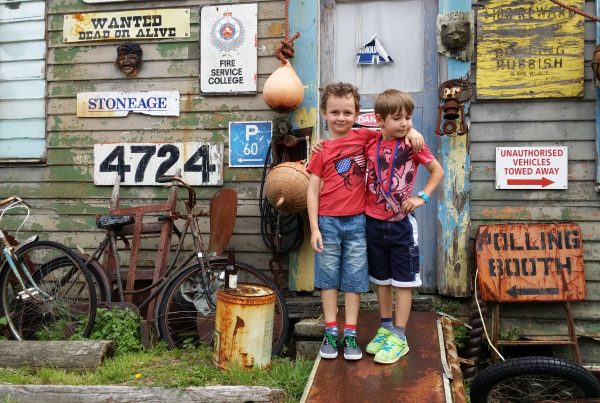
It’s a brilliant spot, an afternoon sun-trap, and long a favourite of mine for a daytime coffee. It is also, I reckon, just about the nicest first-date spot in the city, as long as you can persuade your companion to stop staring at the extravagantly moustachioed Lorenzo shimmying his way around the tables, or the equally handsome but more restrained Leonardo quiet and watchful from behind the bar. Listening back to the recorded interview the following day, not only was I often unable to distinguish which of the two brothers was speaking, it was often a case of one speaking and the other finishing his sentence for him.
“I used to live just over the road, in the Access Radio building. And I’d come in here for a glass of wine when it was the old Imbibe. I loved it. There was the Met Shop next door — which we still miss — and then there was this bar, facing out onto a car park, and it was brilliant. It changed the character of this little area. Suddenly it wasn’t just the car park, and a footpath to the back of a post office… it was a place you wanted to go. I used to dream about how much I’d like a space like this, about how the right place can transform everything around it.”
By any standards, the boys are successful restaurateurs. Their philosophy — the only way they know how to do things really — is to be present, to be hands on, and to lead from the front.
“You have to be there. You can’t just show up at the end of the night and collect the money. Your staff have to know that you do what they do. They see you taking out the rubbish at the end of the night, and they know you know their jobs. It’s not about ‘keeping an eye’, it’s about creating a place that you want to be. There’s that old rule about opening places you yourself want to be a guest at, well I reckon we take it a step further, we open places that we want to be employees at. And if you get that right, you attract the people you want to be with… and everything else comes from that.”
“We’re not chefs. I’m in awe of the guys we have in our kitchens. Some nights when it’s pumping in there, and there’s good food flying out, and the pressure’s on, they just get better and better. It’s incredible. We couldn’t ever thank them enough, or respect them enough, or look after them enough. I mean, we’ll cook at home for family and friends. There’s nothing I like more than having ten people over for dinner and making sure they have the best time. But our guys… they can do that for 50 people they haven’t met. It’s awe-inspiring, truly.”
We talk for an hour. There’s strong espresso, and a hot streak of afternoon sunlight dancing around the table. The boys both have piles of paperwork in front of them — accounts, sketches, notes for menus — but they are still totally engaged in the conversation. I appreciate that. It is an unusual amount of focus from two young and very busy men.
“When the whole thing is working like it should, when the kitchen are just pumping out amazing food that you can be so proud of, and the whole crew are clicking, and someone comes up to you at the end of the night and says, ‘That person… they were amazing’, and they’re talking about someone who’s new or someone you’ve worked with for years — it doesn’t matter — it’s very humbling. And the thing is, other jobs, other vocations, people can go years without being singled out for praise — God, some restaurants are like that too — but in our places, they’re being told all night that they’re fantastic. Because they are, and because something about these places lends itself to that. No other job is like that I think. That’s why people get addicted to hospo — to the career.”
[quote]“You can’t grow up Italian without a close relationship with the kitchen.”[/quote]
And there is a new restaurant to build and open. By the time you read this it may already have happened. But we’re talking in the first week of February, and the place looks — in Leonardo’s words — “like a building site in a student flat”.
‘The place’ is the building on the corner of Willis Street and Karo Drive. To a generation of Wellingtonians it will always be the site of the original Bar Bodega. I once rented an old two-storey pile across the road, and I knew that bar and its Gisborne Gold all too well. The first writing I was ever paid for was piece in the Evening Post, arguing that the Historic Places Trust should be preserving the old stables that housed the bar, and not just the shops that fronted onto Willis Street.
That fight was lost, of course. Nothing that requires a sense of humour ever makes it past a bureaucracy. But at least what’s left of the building is being used again. The new restaurant promises to be the flagship of the group.
“There will be different areas, different dining rooms, a separate bar, a courtyard… I guess we’re doing our Il Casino.”
The boys, as if you didn’t know this, are the sons of Remiro Bresolin — ‘Wellington’s most famous Italian’, as someone once dubbed him — who came here as a young man and started a series of restaurants. Il Casino was his castle, and with the family he brought out from Venice, and the families he founded here, he ran it for 30 years.
“Paps met a Kiwi girl in London, and he chased her all the way to New Zealand. The affair didn’t work out, but he stayed. When he got here he was an artist, and he started teaching art in Auckland at first. But he came to Wellington to have a look around, and he fell in love with the place. It must have been a sunny day, eh? He had a different name too — an artist’s name — when he arrived he still called himself Merko…
“He set up the first pizza joint in town, and then he met Faith. She was the one who converted the old toilets in Cambridge Terrace into a restaurant. They married, and here we are.
“He lived in Wellington nearly all his life, but when he said ‘home’ it was always Italy. As soon as he could afford to, he went back there for a month every year, and he took us with him. It’s the well-spring, y’know?”
There is a break; a phone call that has to be returned. I take a moment to walk outside in the sun, and look up and down this little sliver of Wellington. The building that houses Duke Carvell’s is an anachronism, and a gem. The tables outside are packed with a happy, chattering lunchtime crowd. The women all look successful and dynamic, the men are all beautifully dressed. I love this place.
“Serving good food and good booze is relatively easy,” says Lorenzo, as we resume. “There’s a lot of places that can do that. But the funny thing is, a lot of places that served great food and great booze, they’re not even here anymore. So I say it’s more than that. You’ve got to bring people home, y’know. You’ve got to bring them into your home and give them a great time. You’ve got to give them exactly the time they want, and then you’ve got to add something on top of that. So that when they leave, they’ve had everything they came for, but something else they might not even have known they wanted. And that can be as simple as great service, or a twist that the kitchen has put on something, or just a slice of the atmosphere. It’s great to live up to their expectations, but if you can exceed them, that’s what people come back for, and that’s what they’ll tell their friends and their colleagues about. And of course then, their expectations are even higher next time, so we have to exceed them all over again. That’s the whole game.”
I’m nearly packing to leave when I notice the tattoo Leonardo has on his upper arm. It is of Remiro’s signature, as bold and flamboyant as you could wish.
“When he passed, I wanted to do something to honour him, and this felt right. But, also, he hated tattoos, so I get to have a laugh at him too. I think he would have liked both sides of that.”
Lorenzo laughs hard at this too, as though he is also hearing the story for the first time.
“I was back there about ten years ago, in Venice, seeing the family, working at the old pizza place. I’d been there about two weeks, and I’m heading to the tobacconist around the corner — the local tobacconist, been there for generations — and the woman behind the counter — she’s been watching me, she’s got red hair, must be about 60 — she says to me, ‘Tu sei il figlio di Merko?’ (‘You are the son of Merko?’) — and I tell her that I am. And she just says ‘This I know’. Thirty years later, she’s seen me walking along, and she’s recognised the old man’s moves, y’know?
“So I go home and I tell my uncle, and he roars with laughter. And he says ‘Oh yes, la testarossa (the redhead)… he broke some hearts your Papa did.’
“And I could just see it, y’know? The beautiful 19-year-old redhead working at her mama’s shop, and the young guy from around the way, and people live and die, but nothing has really changed. And that’s Europe, a whole world played out on a street corner. I think part of Paps never left that. That’s what he tried to build here. We’re just carrying on.”

 & Leonardo Bresolin" style="display: none;" />
& Leonardo Bresolin" style="display: none;" />




